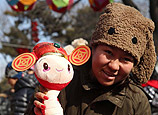
Zhu Ming, a marriage expert with the Shanghai women's federation, believes work pressure, faster modern lifestyles and the economic development of China are all contributing to people getting married later. Also, she says, people born after the 1980s are less mature mentally than their parents were at their age and they generally have a longer study plan, all of which contribute to late marriage.
Yet the trend has also sprawled to those taking their first steps post-1990. Zhou Yunzhu, born in 1991, used to turn to her parents for problem solving when she was a freshman. But now eyeing graduation next June, Zhou says she would hesitate to rush home to face her mum and dad's pressing questions about her future plans.
"The thought of being embarrassed, misunderstood, and what's worse, having their ideas imposed upon me really freaks me out," says the 21 year old.
Zhao Changtian, editor of Mengya, a literature magazine known for targeting '80s and '90s children, maintains that China is entering an era of intensifying tensions between family tiers.
"Communication between generations becomes fragile when the younger generation has seen and experienced a pace of change in society far faster than their parents," Zhao says, but predicts that things may ease when the young generation grows to be the elders of their family.
"The word 'Spring Festival' conjures up the image of home, sweet home, altogether with the well-intentioned care of dear relatives, so please allow us the right of staying aside quietly, which is another way of expressing our love," wrote netizen "Zhoudeshijeixian" on Sina weibo.

















 Overloaded truck crushes bridge in NW China
Overloaded truck crushes bridge in NW China


![]()
